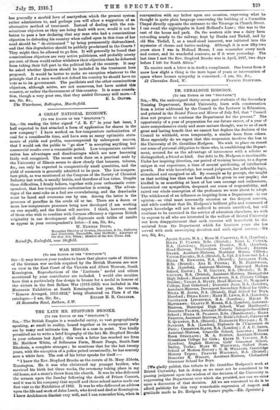A GREAT NATIONAL ECONOMY.
[TO THE EDITOR OP THE " SPECTATOR...1
SIR,—On reading the letter signed " J. R. F." in your last issue, I half expected to find attached a form of application for shares in the new company ! I have worked on low-temperature carbonization of coal for a considerable time, and have seen so many optimistic state- ments of yields and profits, unaccompanied by subsequent success, that I would ask the public to " go slow " in accepting anything but commercial results over a reasonable period. Low-temperature carboni- zation has advantages and disadvantages which are now becoming fairly well recognized. The recent work done on a practical scale by the University of Illinois seems to show clearly that benzene, toluene, Sm., can only be expected in comparatively small quantities, and the yield of ammonia. is generally admitted to be poor. The low-tempera- ture pitch, as was mentioned at the Congress of the Society of Chemical Industry last week, is usually brittle, and therefore of leas value. Despite these difficulties, I firmly believe, together with your enthusiastic corre- spondent, that low-temperature carbonization is coming. The advan- tages of the semi-coke as a fuel are overwhelming, and the drawbacks must be faced and overcome one by one. Among the latter is the presence of paraffins in the crude oil or tar. There are a dozen or more low-temperature processes being now developed (I am working on one myself), and the fittest will survive. I think, however, most of those who wish to combine with German efficiency a vigorous British originality in our development will deprecate such tables of results as appear in your correspondent's letter.—I am, Sir, ho.,
W. NEWTON DREW, Managing Director of Newton, Chambers, & Co., Collieries and Ironworks, Thomeliffe, near Sheffield : Associate of the Roy. Sch. Mines ; Member of the Soo. Chem. Ind.
Roindilie, Bcclesfield, near Sheffield.






























 Previous page
Previous page